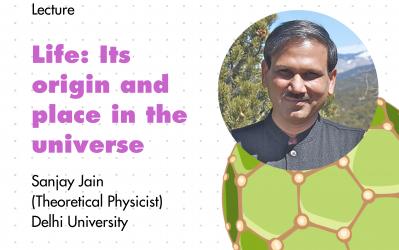Abstract:
A living cell is a highly complex chemical organization in which many different types of molecules exist and play different roles. Through their interactions the molecules end up cooperating with each other to collectively endow the cell as a whole with the property of life, even though each molecule is individually a non-living object. A puzzle in the origin of life is: How can such a complex organization of molecules emerge spontaneously in an environment such as that of the pre-biotic earth? The talk will discuss a possible scenario for such an emergence.
The origin of life unleashed a new creative exploration of the universe through the evolution of life. The talk will survey some landmarks in this process, including the emergence of multicellularity, intelligence and human societies, and the occurrence of mass extinctions. The talk will end with some reflections on the place of life in the universe, in the light of its origin and evolution on Earth and its possible existence elsewhere.
About The Speakers:
Sanjay Jain's current research interests are in theoretical biology and complex adaptive systems. He did his undergraduate studies at St. Stephen's College, Delhi, and Masters at the Department of Physics and Astrophysics, University of Delhi. Obtaining his Ph.D. in theoretical physics from Tata Institute of Fundamental Research, Mumbai, he did post-doctoral work at the physics departments of Brown and Harvard Universities, working on string theory, quantum gravity, quantum field theory and statistical mechanics. He was a faculty member at the Centre for Theoretical Studies, Indian Institute of Science, where he started working on complex systems. Since 2002 he is Professor at the Department of Physics and Astrophysics, University of Delhi. He is an External Professor of the Santa Fe Institute, a former Addie and Harold Broitman Member of the Simons Center for Systems Biology at the Institute for Advanced Study, Princeton, and a Fellow of the Indian Academy of Sciences.




